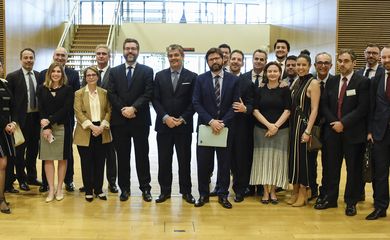Foreign Minister: EU deal to spur Brazilian economy


The commercial deal between Mercosur and the European Union (EU), signed in Brussels on Friday (28) after 20 years of talks, will invigorate the Brazilian economy as a whole, said Brazilian Foreign Minister Ernesto Araújo. During a press conference in the capital of the European bloc, broadcast live online, the chancellor argued that gains should go beyond the increase in agricultural exports stemming from lower tariffs.

“An agreement of such magnitude should not be looked upon from the static viewpoint, with the reduction in tariffs facilitating access to a certain product. [The deal] affects the whole of the economy, attracts investment, which makes things easier, like the import of supplies to boost the competitiveness of a certain intermediate product that might be part of the production chain of a third-party country, not necessarily in the European Union, thanks to the rule of flexible sources,” he explained.
Araújo described the pact as strategic for all sectors of the Brazilian economy as it paves the way for lower costs and the opening of key markets for Europe, which the minister referred to as the world’s biggest importing market. He also mentioned Brazil’s crucial role in global production chains.
“All of this makes an economic impact that goes beyond the large-scale businesses, and [benefits] producers that were unable to sell but now will, because tariffs were reduced. On the Brazilian industry’s side, the agreement facilitates the import of capital goods and state-of-the-art machinery. This will boost the manufacturing industry for a long time,” the minister argued.
The move will expand Brazil’s outlook for gains as it brings Brazil on a par with other economies sharing deals with the European Union, like Mexico and Canada, Araújo went on to note. “This affects agricultural and industrial products, sector by sector, striking a balance in conditions. We were lagging behind in this connection,” he said.
Safeguards
Araújo, Agriculture Minister Tereza Cristina, and Marcos Troyjo, special secretary for Foreign Trade and International Affairs with the Economy Ministry, did not disclose further details on the agreement, vowing its full content will be made public later on. They confirmed the EU retained the safeguard for Brazilian agricultural goods, but said other concessions made up for it.
Safeguards are automatic protective measures in case of a surge in imports harming the competition with local goods.
Gains
The agreement, Troyjo pointed out, not only provides Brazil with more access to foreign markets, but also facilitates deliberations on the economic agenda in Congress.
“We’re going through a moment in Brazil with five fronts for economic reforms. This requires modernization in trade and competitiveness. In other words, the opening of commerce serves as an institutional accelerator. Examples around the world show that deals are a tool to modernize internal rules,” he said, adding that, in addition to changes in the legislation, opening the economy also encourages Brazilian companies to modernize themselves.
A piecemeal shift
Trade barriers are expected to be reduced gradually. Minister Tereza Cristina reported that protection measures for wine from Mercosur will be abolished in 12 years. As for manufactured goods, Troyjo explained that the deal includes tax alleviation every 10 to 15 years depending on the product in question.
Tereza Cristina went on to say that, wherever Europeans did not agree to reconsider their quotas, tariffs were lowered. “Where we had no gains in volume, we gained in tariffs. […] There were gains on both sides. There can be no deal where only one side is favored,” she said.
In the view of Chancellor Ernesto Araújo, “if the two main members of the European Union—Germany and France—agreed to close the deal, it is because these two nations were convinced of the importance of Mercosur and the importance of closing this agreement. In none of the areas within the scope of our policies did they pose problems in the negotiation of the deal.”


